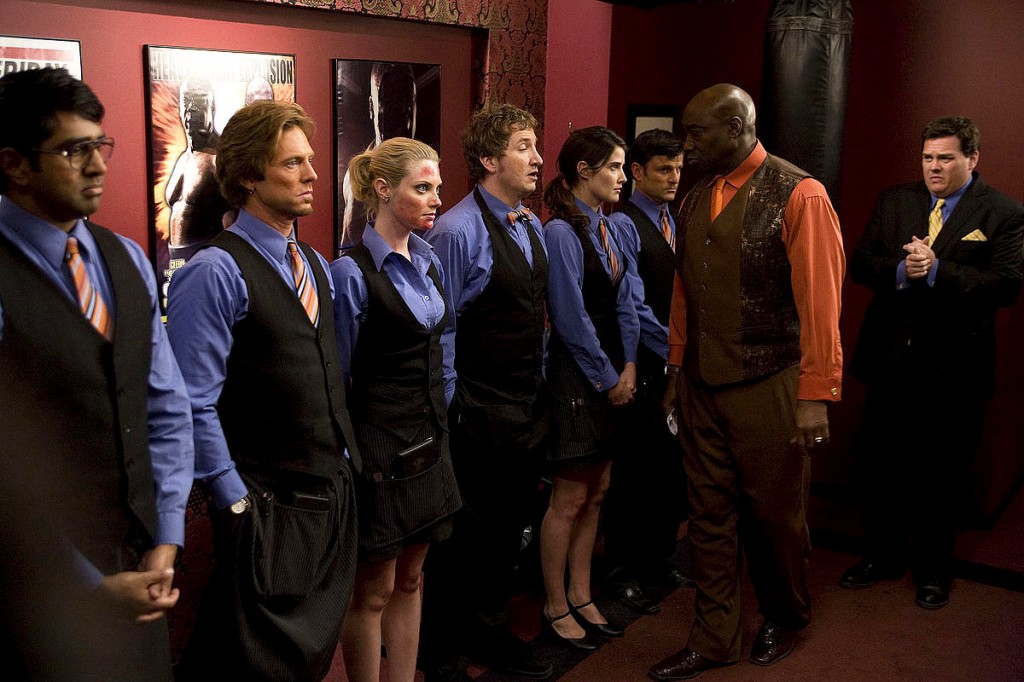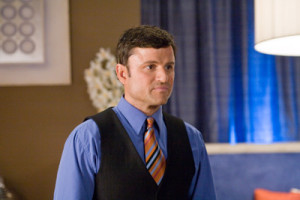 The five man comedy troupe Broken Lizard have been steadily turning out dependably funny comedy since they first hit big with their second film, the cop comedy Super Troopers, in 2001. The film was such a hit that it lead to more Hollywood work for the group both collectively and individually.
The five man comedy troupe Broken Lizard have been steadily turning out dependably funny comedy since they first hit big with their second film, the cop comedy Super Troopers, in 2001. The film was such a hit that it lead to more Hollywood work for the group both collectively and individually.
Their latest film, The Slammin’ Salmon, opens in limited release this weekend. Set in a high-end Miami seafood restaurant owned by a belligerent former boxer played by Michael Clarke Duncan, the staff find themselves under pressure to bring in a night’s worth of receipts to cover the owner’s debt to a Yakuza crimelord. Needless to say with one waiter off his meds, another slowly getting drunk and a waitress slowly burning her face off through a variety of accidents, things are not going to go as planned. The Slammin’ Salmon marks the first film from Broken Lizard that wasn’t directed by member Jay Chandrasekhar. Instead Heffernan has taken over the directorial reins, delivering the same trademark Broken Lizard comedy that fans have come to expect while spicing the movie with a few directorial flourishes of his own.
I sat down for a quick interview with 40% of the group – Heffernan and Steve Lemme – to discuss the new film.
We started off the interview with a confession.
FilmBuffOnLine: I literally finished watching the screener for the movie about 20 minutes ago.
Kevin Heffernan: In the car on the drive over?
FBOL: Actually, sitting over in the Marathon Grill on my laptop.
Steve Lemme: Nice.
KH: Did you at least have headphones?
FBOL: Yes. After the first “motherfucker”…
SL: How is it to watch a movie like that under duress?
 FBOL: Not the worst conditions I ever watched a movie under, but still… It was a lot of fun. Michael Clarke Duncan blew me away.
FBOL: Not the worst conditions I ever watched a movie under, but still… It was a lot of fun. Michael Clarke Duncan blew me away.
KH: Yeah, yeah. Unbelievable.
FBOL: He’s the secret weapon of this movie.
KH: Oh yeah. He steals it and it’s something you don’t expect. He gives you a performance like you’ve never seen before.
FBOL: What inspired you to cast him?
KH: When we wrote [the movie], the premise that we came up with was if you’re a waiter in a restaurant and the restaurant was owned by Mike Tyson, what would that be like? Would he beat the crap out of you, or what? We started writing this character in the voice of Mike Tyson. There were flights of fancy and there was all these kind of crazy things he says. And then you’re like, oh shit, you got to cast that part. Who do you get to play a believable boxer who can terrify you and kill you and also do this comedy stuff?
SL: We did consider Mike Tyson for a few moments.
KH: For a heartbeat.
SL: We were like “Could we? Should we?” There was the “X-factor”-
KH: We couldn’t get insurance for the movie.
SL: Yeah.
KH: Obviously, he physically fits the role and he had done Taladega Nights. So we gave him the script and he loved it. What we didn’t know was could he do what was on the page. Green Mile, he’s nominated for an Oscar. But does he know comedy? Is going to improvise or what? The first day he had all his lines, he was great. He improvised, he had comedy… And you’re like “Oh my God!” And he just went from there.
SL: It’s hard for us, especially with this character most of all. We find that when other actors come and read some of our dialogue… We intentionally twist logic around a little bit, so sometimes it is hard for people… It’s easy for us, because we’re writing it, but for other people to grasp it… And we were looking at this thing like “Jesus Christ.” Not only are there these huge chunks of dialogue but they have to do with nothing that actually makes any sense. As an actor you can’t grasp on to “Oh, it’s about this particular theme,” because its – Bam! Bam ! Bam! – all over the place.
KH: When we met him he was so funny and we were like “Michael, why don’t you do more comedies?” and he was like “I don’t know. No one ever offers me.” He’s the big scary guy. Hopefully after this he’ll get a chance to do more comedies because he is just inherently a funny guy.
FBOL: In most of your films, you guys circle around an authority figure, almost a Margret Dumont character to your Marx Brothers. Is that a template you consciously pursue or does it grow organically out of the ideas you pursue?
SL: Well, our first movie was Puddle Cruiser and that did not have one. I think it was born out of necessity. I might be wrong, but I remember when we were writing Super Troopers the advice that was given was “Nobody knows who you are so you’ll have to have some name actor with you.” So we were like “OK. We’ll have an older gentleman, our police chief.” It seems to be a good model.
KH: Even Beerfest, for example, we put Cloris Leachman in to that role. You can have someone who is outside of your food group like Michael or Cloris or Brian Cox and it opens up your movie a bit more. I think it is intentional. Also, when you are playing screw-ups or anti-authority people you always need that element of authority somewhere floating around in the script.
FBOL: What is your process for writing?
KH: It’s pretty much everyone sits around a table. It could be one guy has an idea or two guys have an idea, but ultimately you sit down at a table with five guys and you start throwing ideas out. One guy will be in charge of transcribing and keeping it all organized. You keep getting ideas until the point where you make an outline and then a script.
FBOL: The script is pretty hammered down by the time you go in front of the camera?
KH: When we made a film like Puddle Cruiser you don’t have the money to do multiple takes. It was always a good idea in our minds to have the script solid and you get in there, do your two takes and get out. As time has gone on, we’ve become more efficient and have a little bit more money, so we can expand that. We tend to layer joke in the more drafts we do, and then if some things don’t work you can take them out.
 SL: It used to be during rehearsals we would improvise a lot. Also, when we’re writing, it would be hard to get a joke through. So if I’m pitching a joke, I’ve got to make four other guys laugh. We all have different senses of humor. So even if it doesn’t go through, if you think it’s good enough, you’ll make a mental note to “improvise” that while on the set.
SL: It used to be during rehearsals we would improvise a lot. Also, when we’re writing, it would be hard to get a joke through. So if I’m pitching a joke, I’ve got to make four other guys laugh. We all have different senses of humor. So even if it doesn’t go through, if you think it’s good enough, you’ll make a mental note to “improvise” that while on the set.
FBOL: See if it flies in front of the crew?
SL: Right, yeah.
KH: A new test audience.
SL: (Pointing at Kevin) There are some guys in the group who will ask the director, “Do you mind if I try something like this?” And they may get shot down. I don’t ask. I just do it.
KH: Laughs.
FBOL: (To Kevin) This is your first time directing. How did you wrestle the chair away from Jay?
KH: Oh man, it was hard. We did wrestle. Indian wrestling. And surprisingly, he lost. The film came together very quickly because we shot it independently. So we were putting the financing ahead of the writer’s strike last year, so it was a very quick process. At the time it all came together, Jay was obligated to another movie. We were working at Warner Brothers at the time and he was obligated to one of their movies, so he couldn’t commit to the eight months to a year that it takes to do all the directorial duties. So I said, “I’ll do it.”
FBOL: Well, you worked on the editing for Puddle Cruiser and Super Troopers before…
KH: It’s so collaborative. We all work together on all different facets of the filming anyway so it’s not like we didn’t know what we’re doing.
FBOL: Were you chosen to direct by the time you guys were writing or after you were done with the script?
KH: We actually started writing this script at the same time we wrote Beerfest. We were getting ahead and we wanted to have a higher budget and lower budget script depending on what was available to us at the time. We wrote multiple drafts before we even got to the point where we decided who was going to play what parts and who was going to direct.
SL: In truth, what happened was is that Club Dread came out and for a variety of reasons, one of which was for our fans it was a shift from Super Troopers, so the movie may not have been one of our fans’ favorites. But we also opened against The Passion Of The Christ.
KH: chuckles growing to a belly laugh while Steve relates the following.
SL: We like to say that the Lord smote us down that weekend. We weren’t in a great place after that came out. So we were like “Alright let’s come back with a multiple attack here- a low budget, medium budget and big budget, which we had anyway just in case. We had some time on our hands, so we were able to do so many drafts of Beerfest and of this movie. If you’ve seen the movie, you know it is very complicated. People are coming in doors, running around… Actually, I thought that would probably be the biggest challenge for him as a director. Everybody is somewhere in a tight spot at all times. I know Kevin had to choreograph the whole thing. If there is a scene going on here, I may still be in the background on fire or something like that.
FBOL: That was a great set. Was that a found location or did you guys build that?
KH: We built it. We got this soundstage in Van Nyes. We had a pretty low budget, so we hired this guy named Erich Schultz. He’s predominantly a construction foreman on movie sets. He’s also a production designer and he built this set for nothing. It was really kind of fun because it was like going to work in a combination TV set but also like a stage play. We had never shot a movie like that. It was 25 days in just that one set.
SL: It also had that awful feeling… If you’ve ever waited tables. Even after a month of being there, just seeing the restaurant, I definitely had that feeling. ‘Not here again…’
KH: You wanted a little variety.
SL: Yeah.




You mean, Van Nuys, right?